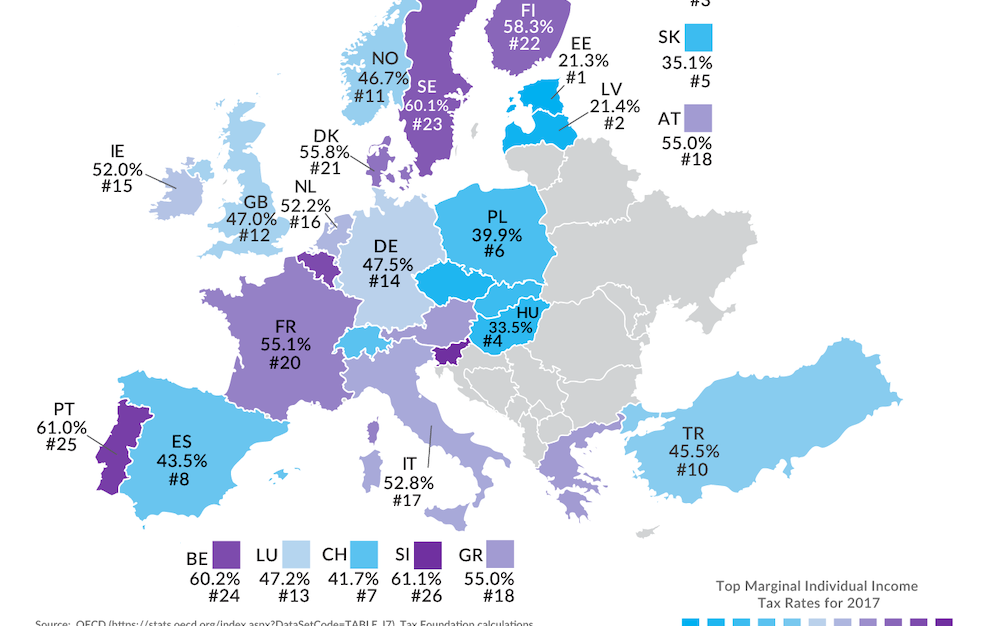(Editor’s note: This article about tax contributions in France originally appeared on The American in Paris. It’s reposted here with the permission of the author.)
I’ve written about taxes numerous times over the years but I don’t think I’ve ever talked about what happens after you file them here in France. As 2020 winds to an end, it’s as good a time as any to explain.
Annee Blanche
One of the numerous campaign promises that President Macron made years ago was a simplification of the tax and pension systems, and one of those reforms meant moving to a “present year” form of taxation instead of the trailing year system we have in the United States (we pay taxes on income we earned the previous year). On 1 January 2019, many people who were in salaried positions began being taxed for their income each time they received a paycheck.
The idea was that since you were paying each month, you wouldn’t need to “save up” to pay taxes the following year. This meant that for many, 2018 would be considered as a “no tax” year, an “annee blanche,” since the government would theoretically only be looking at your 2019 earnings for your 2019 taxes. In practice, it’s pretty much the same as before, but with monthly deductions instead of a lump sum annual payment.
But that still means that your tax charges for any given year are based on what you earned in the previous year. If nothing changes for you financially, your taxation will always remain the same, unless legislation changes the tax code.
Avis d’Impot
Taxes in France are due at the end of May usually. This gives the Ministry of Finance all summer to process your returns and by September you will receive an important document for those who are on a citizenship journey: your “Avis d’impot sur les revenus et prelevements sociaux.”
You’ll need at least five of these in which you are paying taxes (and making a sustainable income) as part of your citizenship dossier. These used to be mailed but now they are available as downloadable PDFs, which makes the normally scary “document a conserver” label pointless. No worry about having to keep a document on file that you can print on command.
This report verifies the return that you have made, though the Ministry of Finance is not bound to it. They can come back for you up to three years after a tax year for any errors or omissions that they find. So, if they have problems with your current return they will tell you. Otherwise they’ll accept it and tell you what remains to be paid for the current year.
So, let’s say that based on your 2019 return, the government estimated that if nothing changed in 2020, you would need to pay 100 euros per month, or 1,200 euros for the year. However, 2020 was good to you (maybe you had stock in Zoom) and you made more money. As a result, when you get your Avis back in September, the government says that instead of the 1200 euros that you were going to pay this year (which they smoothed into 100 euros/month), you now owe 1,600 euros.
As such, your automatic deductions for September-December will double to 200 euros to get you to 1,600 euros total by the end of the year, and your 2021 contributions will now probably be 133.33 euros per month, unless you make more money in 2021, in which case you can expect those contributions to go up, or if you make less money, in which case the contributions go down.
Keep in mind that this is simply for your personal tax return. File a personal tax return in May, get an end-of-year regularization of your personal tax contributions in September.
Declaration Sociales des Independents
So, when you file your French personal taxes the Ministry of Finance makes the calculations and auto-adjusts your contributions. But it doesn’t work that way for filing your French business taxes. Once you’ve filed your business return, you’ll need to enter in certain values from your return into a website, in this case, it’s a website called net-entreprises.fr.
Now, I’m not your accountant, and that’s who you should be speaking with regarding these various boxes, as your business may have certain revenues and contributions that I have not made and vice versa. But the two most important numbers are going to be XA, which is your total profit, and XD, which is your total revenues (turnover).
You’ll also need to report if you received certain benefits or have certain obligatory contributions, but at the end of all this you are going to push “submit.” This has to be done no later than the end of June normally, so unlike your personal taxes, which give you your new amounts owed in September, your revised business contributions to URSSAF will immediately display.
To follow the previous example, if you were paying 200 euros per month in contributions to URSSAF (if you don’t know, this is your social security and health care contribution as a business) based on your previous year’s revenues, and this year was better, they will increase your charges in September-December in order to make you current for the year, then create a new schedule of payments for you for the following year based on your new “normalized” revenues.
The corresponding document you will get from URSSAF will come much sooner than September, probably sometime in early August, and this year would look like: “Regularisation des Cotisations 2019 et Appel de Cotisations 2020.” URSSAF hasn’t yet caught up technology-wise with the Ministry of Finance so they are still sending these by mail, but I expect them to go paperless pretty soon.
President Macron has been pushing the dematerialization agenda pretty hard across all government agencies and that’s a good thing: more digital documents + less paper = fewer things to lose.
In this same document they will give you an estimate for your monthly contributions for the following year but it’s only “provisional” as things can change. For example, this year URSSAF stopped taking our contributions beginning in March which didn’t mean our charges were forgiven, but that September-to-December of this year took up all the burden of the contributions that were not deducted from March-to-August
URSSAF did tell us that we could continue to manually make payments during this time, but they made it sufficiently complicated that the majority of us opted to take the “free rent” from the government and just wait until later in the year when the charges would catch up.
Digital Has Its Benefits
So I hope that you now have a better understanding of how taxes work in France and the fact that what you file in the spring has consequences in the autumn, for better or worse. An increasingly interconnected digital system across all the government agencies is reducing error and making managing your accounts easier, though of course this risks leaving behind the elderly, who are less comfortable with technology, or the poor, who don’t have ready access to the internet or computers.
Thankfully there are agencies and associations trying to help these and other groups keep up with change in France.

About the author:
Singaporean-born American Stephen Heiner has been living in Paris since 2013, what he hopes to be a permanent home after living in Asia and the United States for most of his life. While he has an undergraduate degree in literature, he also has an MBA, and he’s very much the man who enjoys studying financial statements as much as he enjoys reading essays by G.K. Chesterton or James Howard Kuntsler.
He visits his family in the U.S. and Singapore each year, but in the meantime enjoys his dream city, which he finally had a chance to move to after selling a company he built over a number of years.
You can find him on twitter and instagram @stephenheiner.
You can also follow his immigration journey on www.theamericaninparis.com, where Stephen also offers consulting to those interested in relocating to, and/or making a life in, France.
See more of Stephen’s Dispatches posts here.














